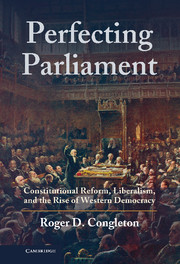Book contents
- Frontmatter
- Contents
- Preface
- 1 On the Origins of Western Democracy
- Part I Sharing Sovereignty
- 2 Team Production, Organization, and Governance
- 3 Organizational Governance in the Long Run
- 4 The Origins of Territorial Governance
- 5 Constitutional Exchange and Divided Governance
- 6 The Power of the Purse and Constitutional Reform
- 7 Suffrage without Democracy
- 8 Ideology, Interest Groups, and Adult Suffrage
- Part II Historical Evidence on Western Democratic Transitions
- Part III Analytical History as Social Science
- Appendix Methodological Approach, Limits, and Extensions
- References
- Index
6 - The Power of the Purse and Constitutional Reform
Published online by Cambridge University Press: 05 June 2012
- Frontmatter
- Contents
- Preface
- 1 On the Origins of Western Democracy
- Part I Sharing Sovereignty
- 2 Team Production, Organization, and Governance
- 3 Organizational Governance in the Long Run
- 4 The Origins of Territorial Governance
- 5 Constitutional Exchange and Divided Governance
- 6 The Power of the Purse and Constitutional Reform
- 7 Suffrage without Democracy
- 8 Ideology, Interest Groups, and Adult Suffrage
- Part II Historical Evidence on Western Democratic Transitions
- Part III Analytical History as Social Science
- Appendix Methodological Approach, Limits, and Extensions
- References
- Index
Summary
The theories of governance and constitutional bargaining developed in the previous chapters provide a rational-choice explanation for the general architecture of European governance, for peaceful reforms of parliament, and for the existence of divided governance. To more fully account for the transition to the contemporary architecture of Western democracy, however, requires analysis of specific aspects of governance: in particular, those dealing with fiscal authority and the manner in which members of parliament are selected. This is undertaken in the next three chapters. Chapter Six provides an explanation for the medieval power of the purse and analyzes how it can be used to obtain additional policy-making authority for parliament. Chapters Seven and Eight analyze possible reforms of election-based methods for selecting members of parliament.
Regional governments have the ability to impose binding rules and fees (taxes) on persons throughout their territories. Their ability to tax – perhaps unexpectedly – provides additional economic reasons for divided governance and additional opportunities for constitutional exchange. To analyze these possibilities, the models of Chapter Five are extended and developed in a more mathematical form. As a consequence, Chapter Six is a long and somewhat technical chapter. The prose provides the intuition behind the mathematics and helps explain the results. Examples from European history are again used to motivate the analysis.
- Type
- Chapter
- Information
- Perfecting ParliamentConstitutional Reform, Liberalism, and the Rise of Western Democracy, pp. 114 - 140Publisher: Cambridge University PressPrint publication year: 2010



